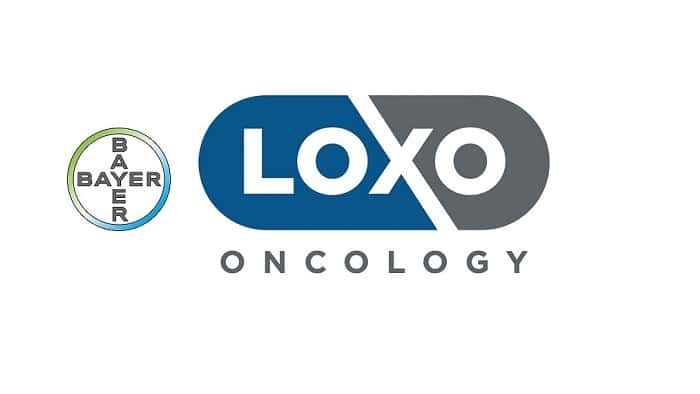Bayer and Loxo Oncology, Inc., a biopharmaceutical company based in Stamford, Connecticut, US, announced updated clinical data from the larotrectinib (LOXO-101) paediatric phase I SCOUT trial (NCT02637687). These data were presented at the American Association for Cancer Research (AACR) Special Conference on Pediatric Cancer Research in Atlanta, US.
Bayer and Loxo Oncology are jointly developing larotrectinib, an investigational compound being studied globally for the treatment of patients with cancers harboring tropomyosin receptor kinase (TRK) gene fusions, which are genetic alterations present across a wide range of tumors resulting in uncontrolled TRK signaling and tumor growth.
“Targeted therapy success stories in paediatric oncology are uncommon, and larotrectinib has invigorated the pediatric oncology community,” said Brian Turpin, D.O., the presenting SCOUT principal investigator and assistant professor in the division of oncology at Cincinnati Children’s Hospital. “Larotrectinib’s near universal response rate and compelling durability of response in pediatric patients with TRK fusion cancers is likely to be practice changing. Furthermore, the first-ever TRK inhibitor response in a TRK fusion glioblastoma patient highlights the potential for larotrectinib in TRK fusion central nervous system tumors.”
“These data confirm that larotrectinib – a highly differentiated compound – can deliver consistent and durable responses in TRK fusion patients across age groups and multiple tumor types,” said Robert LaCaze, executive vice president and head of the oncology strategic business unit at Bayer. We hope these data continue to support future milestones that will ultimately improve outcomes and change the course of cancer care for TRK fusion patients and their families.”
As of the July 17, 2017 data cut-off date, 24 paediatric patients were enrolled, including 17 patients with TRK fusion cancers. TRK fusion patients carried primary diagnoses of infantile fibrosarcoma, thyroid cancer, and various soft tissue sarcomas. The Overall Response Rate (ORR = PR + CR, Partial Response + Complete Response) in the TRK fusion patients was 93 per cent as assessed by both the investigators and an independent review committee. Among the 17 patients with TRK fusion cancers, 94% either remain on drug or received surgery with curative intent; four patients have been followed greater than one year and 12 have been followed greater than six months. The larotrectinib adverse event profile is consistent with data previously presented publicly. The most common treatment-related adverse events at the dose given in the Phase II, included increased liver function tests, neutropenia and nausea, all largely grade 1.
Larotrectinib (LOXO-101) is a potent, oral and selective investigational new drug in clinical development for the treatment of patients across a wide range of cancers that harbor abnormalities involving the tropomyosin receptor kinases (TRKs). Growing research suggests that the NTRK genes, which encode for TRKs, can become abnormally fused to other genes, resulting in growth signals that can lead to cancer in many sites of the body.
In an analysis of 55 adult and pediatric patients with TRK fusion cancers that were evaluable according to RECIST, larotrectinib demonstrated a 75 percent independently-reviewed confirmed overall response rate (ORR) and an 80 percent investigator-assessed confirmed ORR, across many different types of solid tumors. Larotrectinib received Orphan Drug Designation (ODD) in the US for the treatment of solid tumors harboring NTRK-fusion proteins and in Europe for soft tissue sarcoma. Additionally, the FDA granted breakthrough therapy designation to larotrectinib for the treatment of unresectable or metastatic solid tumors with NTRK-fusion proteins in adult and pediatric patients who require systemic therapy and who have either progressed following prior treatment or who have no acceptable alternative treatments.
In November 2017, Bayer and Loxo Oncology entered into an exclusive global collaboration on the development and commercialization of larotrectinib and LOXO-195, a next-generation TRK inhibitor. Bayer and Loxo Oncology will jointly develop the two products, larotrectinib and LOXO-195, and Bayer will lead ex-U.S. regulatory activities as well as worldwide commercial activities. In the US Bayer and Loxo Oncology will co-promote the products. Loxo Oncology will remain responsible for the filing in the US.
TRK fusions are chromosomal abnormalities that occur when one of the NTRK genes (NTRK1, NTRK2, NTRK3) becomes abnormally connected to another, unrelated gene (e.g. ETV6, LMNA, TPM3). This abnormality results in uncontrolled TRK signaling that can lead to cancer. TRK fusions occur rarely but broadly in various adult and pediatric solid tumors, including appendiceal cancer, breast cancer, cholangiocarcinoma, colorectal cancer, GIST, infantile fibrosarcoma, lung cancer, mammary analogue secretory carcinoma of the salivary gland, melanoma, pancreatic cancer, thyroid cancer, and various sarcomas. TRK fusions can be identified through various diagnostic tests, including targeted next-generation sequencing (NGS), immunohistochemistry (IHC), polymerase chain reaction (PCR), and fluorescent in situ hybridization (FISH).
Bayer and Loxo Oncology, Inc., a biopharmaceutical company based in Stamford, Connecticut, US, announced updated clinical data from the larotrectinib (LOXO-101) paediatric phase I SCOUT trial (NCT02637687). These data were presented at the American Association for Cancer Research (AACR) Special Conference on Pediatric Cancer Research in Atlanta, US.
Bayer and Loxo Oncology are jointly developing larotrectinib, an investigational compound being studied globally for the treatment of patients with cancers harboring tropomyosin receptor kinase (TRK) gene fusions, which are genetic alterations present across a wide range of tumors resulting in uncontrolled TRK signaling and tumor growth.
“Targeted therapy success stories in paediatric oncology are uncommon, and larotrectinib has invigorated the pediatric oncology community,” said Brian Turpin, D.O., the presenting SCOUT principal investigator and assistant professor in the division of oncology at Cincinnati Children’s Hospital. “Larotrectinib’s near universal response rate and compelling durability of response in pediatric patients with TRK fusion cancers is likely to be practice changing. Furthermore, the first-ever TRK inhibitor response in a TRK fusion glioblastoma patient highlights the potential for larotrectinib in TRK fusion central nervous system tumors.”
“These data confirm that larotrectinib – a highly differentiated compound – can deliver consistent and durable responses in TRK fusion patients across age groups and multiple tumor types,” said Robert LaCaze, executive vice president and head of the oncology strategic business unit at Bayer. We hope these data continue to support future milestones that will ultimately improve outcomes and change the course of cancer care for TRK fusion patients and their families.”
As of the July 17, 2017 data cut-off date, 24 paediatric patients were enrolled, including 17 patients with TRK fusion cancers. TRK fusion patients carried primary diagnoses of infantile fibrosarcoma, thyroid cancer, and various soft tissue sarcomas. The Overall Response Rate (ORR = PR + CR, Partial)



















